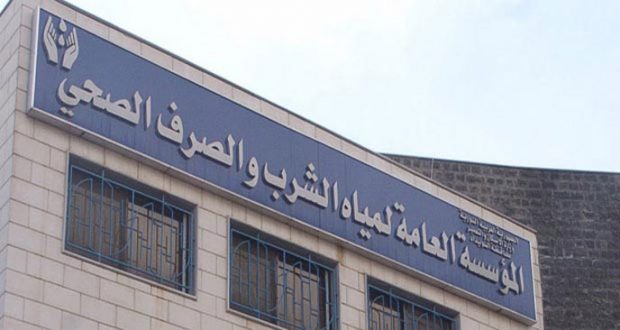Regime’s maintenance workshops raise its flags over Fijah spring and start repairing process, hours after controlling Bsima and raising flags in 4 other towns in the Valley
The Syrian Observatory for Human Rights was informed by reliable sources in Wadi Barada that the Syrian flags recognized internationally were raised above Ain al-Fijah in Barada Valley, in conjunction with the start of the maintenance workshops to repair the water spring and re-pump the water to the capital Damascus, the water is cut off in Damascus since the 23rd of December 2016. The flag-raising came after the workshops entered yesterday to Ain al-Fijah area according to the previous agreement, which was carried out between regime’s authorities and those in charge of Barada Valley, which conditions pumping water from the spring of Ain al-Fijah and Wadi Barada to the capital Damascus, and that each party should commitment to the agreement, and that the agreement will start after pumping the water to the capital Damascus, and that each part takes responsibility for Obstructing or impeding the terms of the agreement.
Where the Syrian Observatory published that the agreement, which took place in the Wadi Barada is to neutralize the water for any clashes, the introduction of workshops maintenance to repair the spring and water pumps, pumping water to the capital Damascus, to prove that the factions are not the responsible of cutting the water the capital , sources of the observatory and confirmed that the ceasefire agreement is to neutralize the water current in the area of military operations, and to ensure the entry of workshops reform and not to be subjected to it, where it was agreed Russian and notables and from the region, as set out to the Syrian observatory for human rights, a copy of the agreement, which was between those in charge and dignitaries from Wadi Barada, with the system authorities, it came to agree:
Dissenters and rednecks exempted from military service for a period of 6 months
Delivery of arms, medium, and heavy and light
The Wanted to settle their conditions of any security agency
The absence of any armed stranger in the area outside the villages of Wadi Barada starting Bsima to Wadi Barada market.
For rebels from outside the region, they are sent to Idlib light their weapons with their families.
For fighters of Wadi Barada who want to leave the region can exit to the light with their weapons Idlib
Non-military entry to homes
Entry of the army into the villages of Wadi Barada, and put checkpoints at the entrance to every village, across the main road connecting between the ten villages
for the people of the villages of Wadi Barada dissidents or retarded can return to serve in their villages as a defense and national forces It is considered like the joining of science as a service or backup service
We wish the return of the expelled employees to their jobs.
The regime forces and Hezbollah have taken control hours ago of the entire town of Bsima in Wadi Barada and near the Ain Fijah town, amid attempts of advancement towards Ain al-Khadra north of Bsima town, after clashes against the rebel and Islamic factions, also mediators of the deal confirmed to the Syrian observatory for human rights that this agreement is the only one that will be applied, after the first phase of negotiations failed a few days ago; about the entry of repair workshops to start repairing and re-pump Ein Fijeh stations’ water to the capital Damascus, and the negotiations were focused on the withdrawal of fighters from the spring, pumping stations and its surroundings, and raising regime’s flags over it even if it is not militarily controlled by the regime forces and remained in the hands of a neutral party close to the regime, who is responsible for the operations of water pumping and controlling.
also reliable local sources reported to the Syrian Observatory for Human Rights that the Syrian flags internationally recognized were raised in the villages of Suq Wadi Barada, in Kfir al-Zayt, Kafr al-Awamid, Deir Meqren and Deir Qanoon, after they entered in a “reconciliation” with regime’s authorities, who with Hezbollah were trying desperately to reach a solution for the water issue and to repair Fijah spring.
Also the Syrian Observatory for Human Rights published yesterday that the regime authorities are seeking to carry out “reconciliation” agreements individually in the villages of Barada Valley in Rif Dimashq, without carrying out a “full reconciliation” agreement with the entire valley area, also the sources of the Observatory confirmed that the matters are still unfinished until this moment, while fighters and leading figures in Barada Valley denied to the Syrian observatory for Human rights that an agreement was reached with the regime about making “reconciliation in Barada Valley” while sources of mediators stressed that the agreement is going on with villages in the valley individually provided that “military operations stay out of them”

